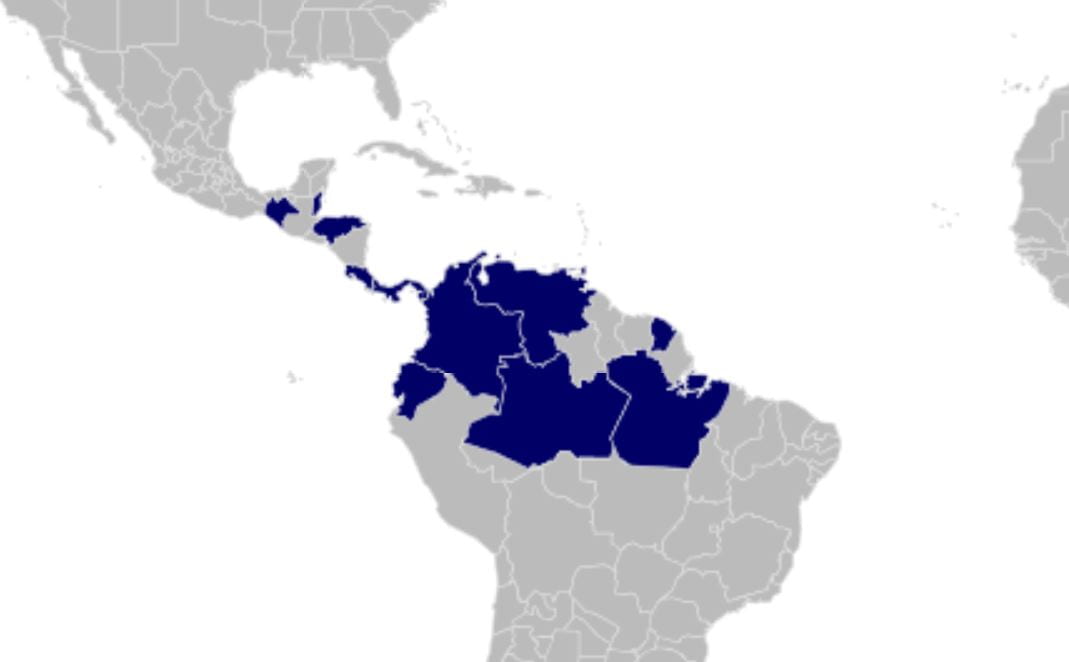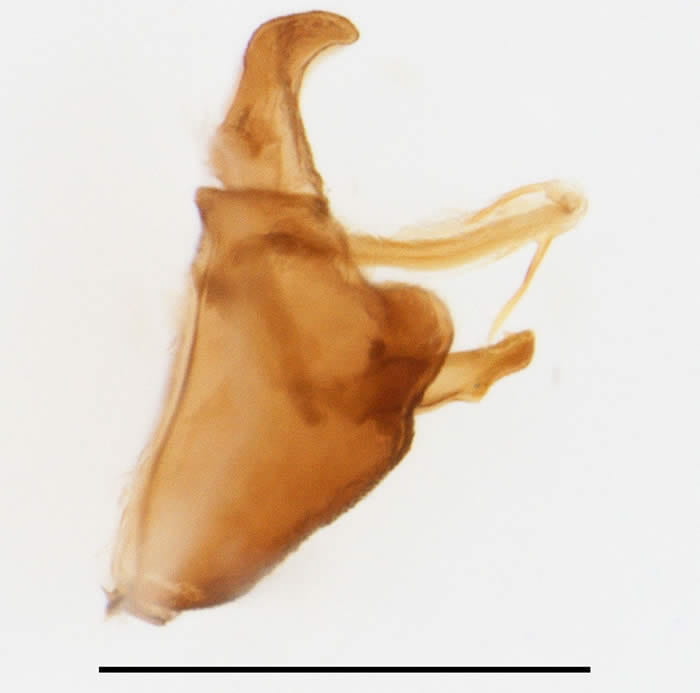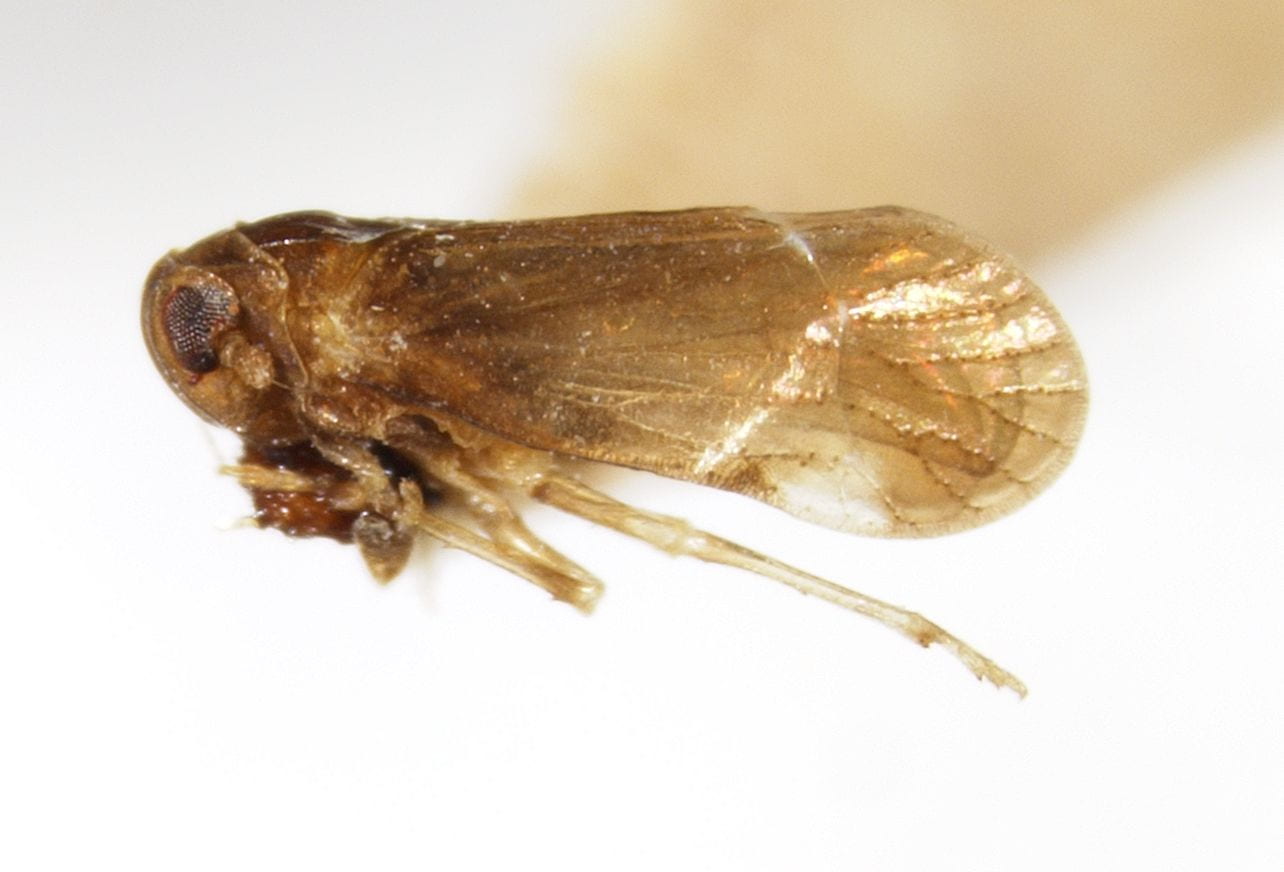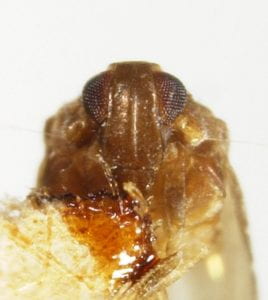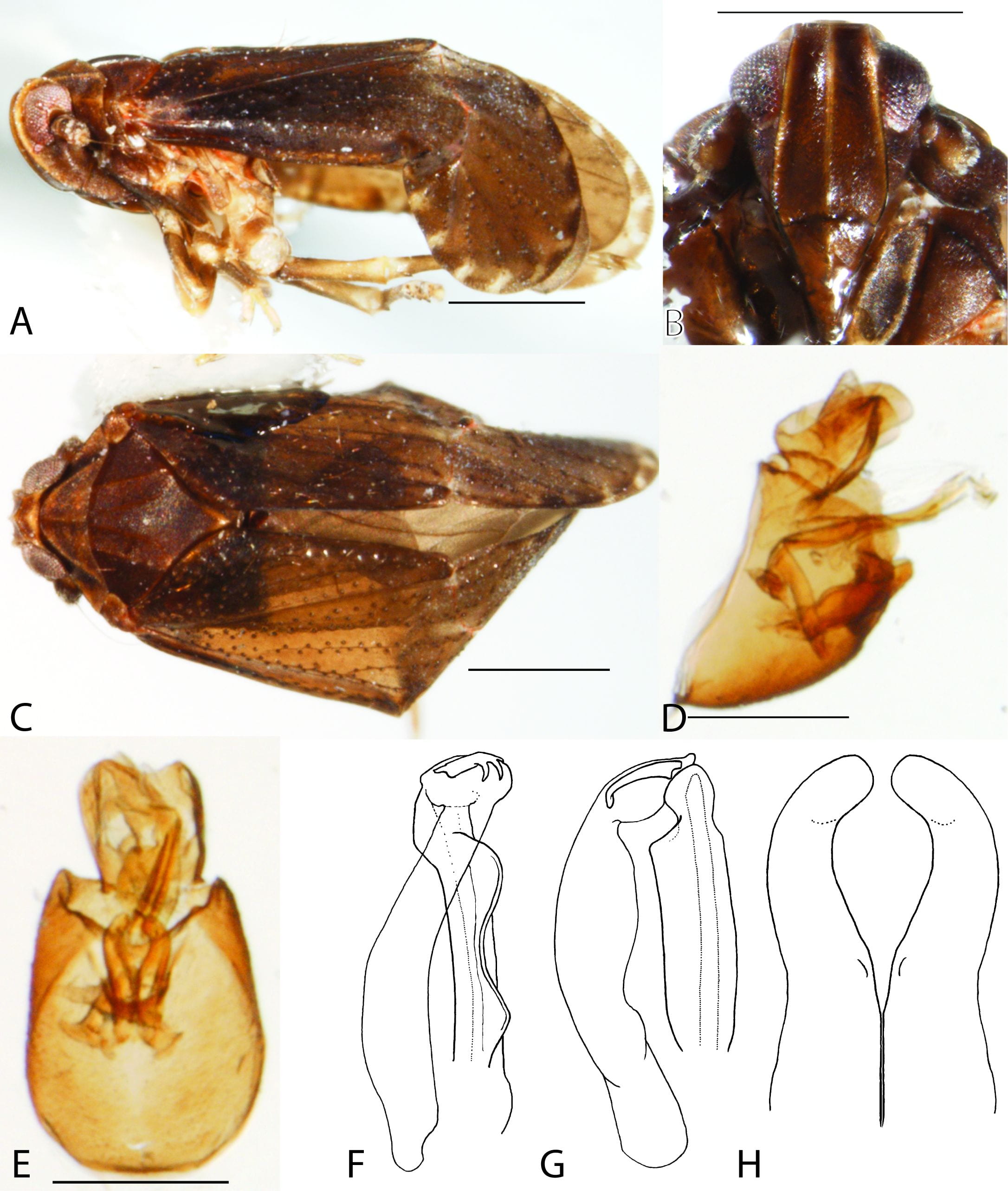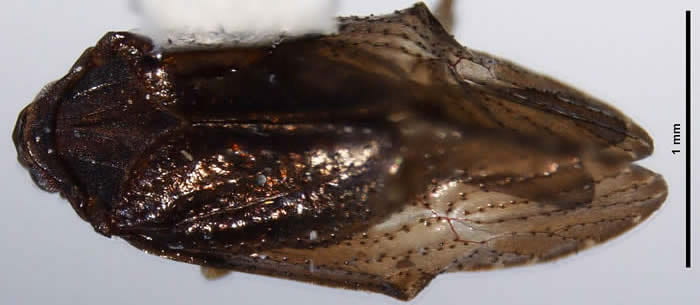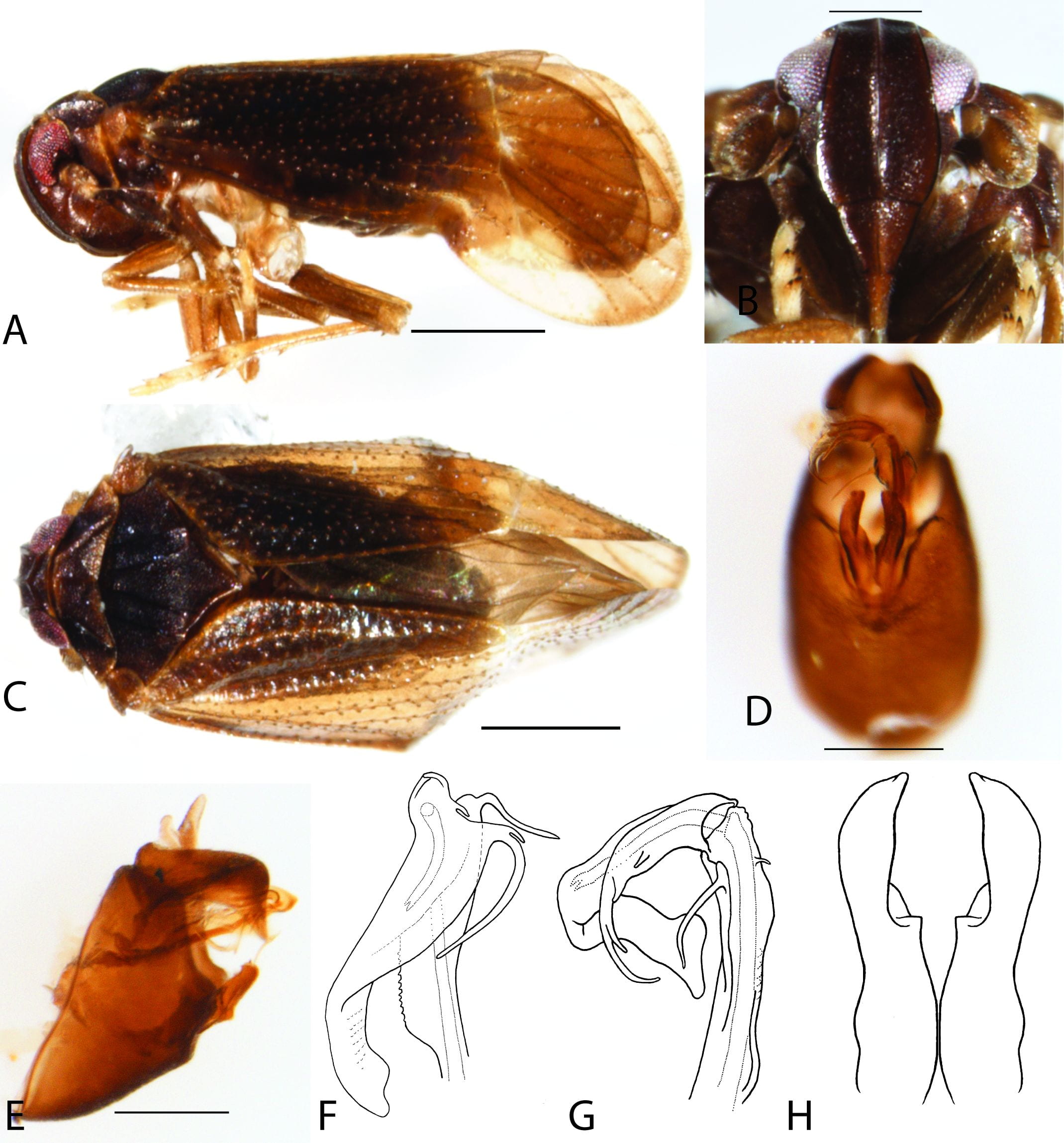[Back to Higher classification of Delphacidae]
[Back to A checklist of New World delphacid species]
Contents
Family Delphacidae Leach, 1815
Subfamily Asiracinae Motschulsky 1863: 108.
Tribe Tetrasteirini Emeljanov 1996
This tribe contains only the genus Tetrasteira Muir, 1926
Genus Tetrasteira Muir, 1926
Type species: Tetrasteira minuta Muir 1926.
Synonyms
none.
Features of the tribe
As described by Emeljanov (1996):
“This tribe is characterized by a short, narrow corypha, extended, fairly narrow metopa with simple median carina, absence of areolet, small flattened antennae, presence of 4 evenly arcuate mesonotal carinae, oblique row of teeth at the tip of the second segment of the hindtarsi, and notch on the posterior margin on the hindwings opposite the tip of CuP.” (p. 139-140).
This tribe is probably closely related to the Platysystatini. Members are quite small (less than 3 mm) and uncommon in most collections. They are separated from the similar Platysystatini and Neopunanini by having 4 (not 5) carinae on the mesonotum and the fastigium in not carinate. The vertex, while wider than long, is much longer than seen in Platysystatini.
Distribution
southern Central and South America (tropical regions).
Recognized species
There are 5 described species in this genus
Tetrasteira albitarsis Fennah, 1945: 427 – Trinidad
Tetrasteira minuta Muir, 1926 [Metcalf 1943: 40] – Brazil
Tetrasteira solata Barringer & Bartlett 2011 – Panama, ? Venezuela,
Tetrasteira trimaculata Barringer & Bartlett 2011 – Belize, Costa Rica, Colombia, Honduras, Mexico, Panama
Tetrasteira vulgaris Barringer & Bartlett 2011 – Ecuador
Also, an undescribed species from Peru.
Plant Associations
None known. Tetrasteira is very common in canopy fogging samples from Ecuador; T. vulgaris, at least, is presumably associated with canopy epiphytes.
FLOW at this point lists no plant associations.
Economic Importance
Limited.
Recognition
All described species are very small and dark colored; similar to the 3 genera of Platysystatini except that the head is much narrower than the pronotum; intermediate carinae of mesonotum diverging (uniformly arched or straight, not sinuate), median mesonotal carina absent; antennae terete, fastigium without transverse carina, lateral margins of frons weakly rounded.
Tetrasteira albitarsis
Tetrasteira minuta holotype
Tetrasteira solata
Tetrasteira trimaculata
Tetrasteira vulgaris
Molecular resources
This genus is not present on Genbank (as of June 2017); but 3 “Tetrasteira sp.” (likely trimaculata) present on BOLD (barcoding was unsuccessful for 3 specimens))
Selected references
Barringer, L. E. and C. R. Bartlett. 2011. A review of New World Asiracinae (Hemiptera: Auchenorrhyncha: Delphacidae) with five new taxa. Cicadina 12: 7-39.
Emeljanov, A. F. 1996. On the question of the classification and phylogeny of the Delphacidae (Homoptera, Cicadina), with reference to larval characters. Entomological Review 75(9):134-150 (Translation of Entomologicheskoe Obozrenie 1995 74: 780-794).
Fennah, R. G. 1945. New Lanternflies (Fulgoroidea) From South America. Proceedings of the United States National Museum 96(3189): 95-106.
Fennah, R. G. 1945. The Fulgoroidea, or lanternflies, of Trinidad and adjacent parts of South America. Proceedings of the United States National Museum 95(3184): 411-520. (p. 427, also here)
Fennah, R. G. 1979 Tribal classification of Asiracine Delphacidae (Homoptera: Fulgoroidea). Entomologist’s Record (I/V./79): 116. [genus noted]
Leach, W. E. 1815a. Entomology. The Edinburg encyclopedia; conducted by David Brewster 9: 57-172. (family Delphacidae page 125).
Metcalf, Z. P. 1943. General Catalogue of the Hemiptera. Fascicle IV, Fulgoroidea, Part 3, Araeopidae (Delphacidae). Smith College, Northhampton, Massachusetts. (Tetrasteira entry begins on. 39.)
De Motschulsky, V. I. 1863. Essai d’un catalogue des insectes de l’ile de Ceylan. Bulletin de la Société Impériale des Naturalistes de Moscou 36: 1-153. (Delphacidae p. 108)
Muir, F.A.G. 1926b. Contributions to our knowledge of South American Fulgoroidea (Homoptera). Part I. The Family Delphacidae. Experiment Station of the Hawaiian Sugar Planters’ Association, Entomological Series, Bulletin 18:1-51, plates 1-5.

